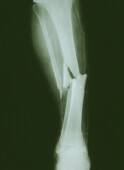
FRIDAY, June 26, 2015 (HealthDay News) — Women prescribed a common class of antidepressants to ease menopausal symptoms may face a long-term rise in their risk for bone fracture, a new study suggests.
The antidepressants in question are selective serotonin reuptake inhibitors (SSRI) medications such as Celexa, Paxil, Prozac and Zoloft.
Besides being used to treat depression, these drugs are often prescribed as an alternative to hormone replacement therapy (HRT) to tackle hot flashes, night sweats and other problems that can accompany menopause.
However, “SSRIs appear to increase fracture risk among middle aged women without psychiatric disorders,” wrote a team led by Dr. Matthew Miller of Northeastern University in Boston.
The team added that the effect seems to be “sustained over time, suggesting that shorter duration of treatment may decrease [this effect].”
The study authors acknowledged that their work did not establish a direct cause-and-effect link between SSRIs and a boost in fracture risk. However, they point out that prior research has highlighted bone-thinning as a possible side effect of antidepressants.
Findings from the study were published June 25 in the journal Injury Prevention.
For the study, researchers sifted through data from the PharMetrics Claims Database, which collects information on drug treatments involving roughly 61 million patients nationally.
In this case, investigators specifically focused on more than 137,000 women between the ages of 40 and 64, all of whom began SSRI treatment at some point between 1998 and 2010.
The SSRIs in question included citalopram (Celexa), escitalopram (Lexapro), fluoxetine (Sarafem, Prozac), fluvoxamine (Luvox), paroxetine (Paxil) and sertraline (Zoloft).
The SSRI group was compared with more than 236,000 other women who had been prescribed indigestion medications instead of an SSRI.
They found that women in the SSRI group faced a 76 percent higher risk for fracture after a single year of SSRI use, compared with the non-SSRI group. That figure fell slightly, to 73 percent after two years and 67 percent after five years, the study said.
One expert in bone health said a relationship between SSRIs and bone weakening does have some basis in biology.
“The authors speculate that the mechanism of action involves the activation of osteoclasts, cells which break down bone, by the SSRIs,” explained Dr. Caroline Messer, an endocrinologist at Lenox Hill Hospital in New York City.
She said that, “While more studies are needed, the trial does suggest that women might want to limit the duration of treatment with SSRIs and perhaps consider taking the lowest effective dose to minimize bone loss.”
More information
For more information on menopause and treatment options U.S. National Institute on Aging.
Copyright © 2026 HealthDay. All rights reserved.

